Belinostat (PXD101)
Synonym(s):(2E)-N-Hydroxy-3-[3-(phenylsulfamoyl)phenyl]prop-2-enamide;(2E)-N-Hydroxy-3-[3-[(phenylamino)sulfonyl]phenyl]-2-propenamide;(E)-N-Hydroxy-3-(3-(N-phenylsulfamoyl)phenyl)acrylamide;
- CAS NO.:414864-00-9
- Empirical Formula: C15H14N2O4S
- Molecular Weight: 318.35
- MDL number: MFCD08064035
- SAFETY DATA SHEET (SDS)
- Update Date: 2024-11-19 15:53:33

What is Belinostat (PXD101)?
Description
Belinostat is a drug which was developed by Spectrum Pharmaceuticals and is currently marketed by Onxeo as Beleodaq®. The drug, which received fast track designation by the United States Food and Drug Administration (US FDA) and was approved for the treatment of hematological malignancies and solid tumors associated with peripheral T-cell lymphoma (PTCL) in 2014, is a histone deacetylase (HDAC) inhibitor and is the third such treatment to receive accelerated approval for PTCL, the others being vorinostat (Zolinza®) and pralatrexate (Folotyn®). Although belinostat was not yet approved in Europe as of August 2014, the compound exhibits a safety profile considered to be acceptable for HDAC inhibitors–less than 25% of patients reported adverse effects and these most frequently were nausea, fatigue, pyrexia, anemia, and emesis.
The Uses of Belinostat (PXD101)
Belinostat is a novel histone deacetylase 3 selective inhibitor, which protects the β cells from cytokine-induced apoptosis.
What are the applications of Application
Belinostat is a novel HDAC inhibitor
Definition
ChEBI: A hydroxamic acid-type histone deacetylase (HDAC) inhibitor with antineoplastic activity.
Synthesis
Commercially available 3-bromobenzenesulfonyl chloride (41) was reacted with aniline in the presence of aqueous sodium carbonate to deliver sulfonamide 42 in 94% yield. Next, this aryl bromide was subjected to a Heck reaction involving ethyl acrylate to give rise to cinnamate ester 43, which was immediately saponified under basic conditions and acidic workup to furnish the corresponding acid 44. This acid was activated as the corresponding acid chloride prior to subjection to hydroxylamine under basic conditions to form the hydroxamic acid, which was then recrystallized from an 8:1 ethanol/water mixture in the presence of a catalytic amount of sodium bicarbonate to furnish crystalline belinostat (VI) in 87% overall yield from acid 44.
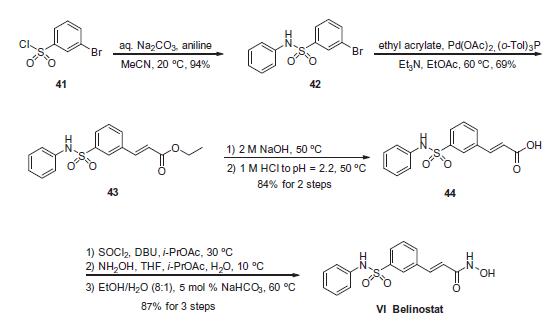
Properties of Belinostat (PXD101)
| Melting point: | 142 - 145°C |
| Density | 1.427±0.06 g/cm3(Predicted) |
| storage temp. | Amber Vial, Refrigerator, Under inert atmosphere |
| solubility | DMSO (Slightly), Methanol (Slightly) |
| form | Solid |
| pka | 8.31±0.10(Predicted) |
| color | Off-White to Pale Orange |
| Stability: | Light Sensitive |
Safety information for Belinostat (PXD101)
Computed Descriptors for Belinostat (PXD101)
New Products
Tert-butyl bis(2-chloroethyl)carbamate 4-Methylphenylacetic acid N-Boc-D-alaninol N-BOC-D/L-ALANINOL N-octanoyl benzotriazole 3-Morpholino-1-(4-nitrophenyl)-5,6-dihydropyridin- 2(1H)-one Furan-2,5-Dicarboxylic Acid DIETHYL AMINOMALONATE HYDROCHLORIDE 1,1’-CARBONYLDIIMIDAZOLE R-2-BENZYLOXY PROPIONIC ACID 1,1’-CARBONYLDI (1,2-4 TRIAZOLE) N-METHYL INDAZOLE-3-CARBOXYLIC ACID (2-Hydroxyphenyl)acetonitrile 4-Bromopyrazole 5-BROMO-2CYANO PYRIDINE 5,6-Dimethoxyindanone 5-broMo-2-chloro-N-cyclopentylpyriMidin-4-aMine 2-(Cyanocyclohexyl)acetic acid 4-methoxy-3,5-dinitropyridine 1-(4-(aminomethyl)benzyl)urea hydrochloride 2-aminopropyl benzoate hydrochloride diethyl 2-(2-((tertbutoxycarbonyl)amino) ethyl)malonate tert-butyl 4- (ureidomethyl)benzylcarbamate Ethyl-2-chloro((4-methoxyphenyl)hydrazono)acetateRelated products of tetrahydrofuran
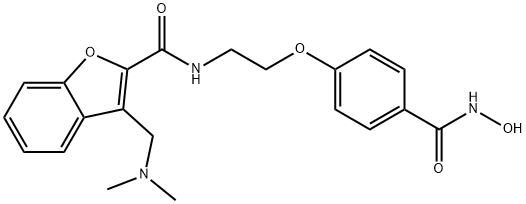


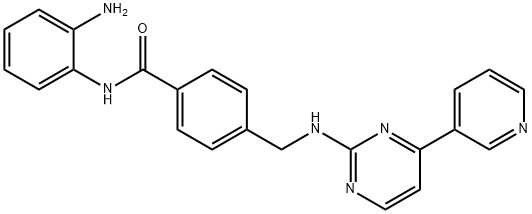
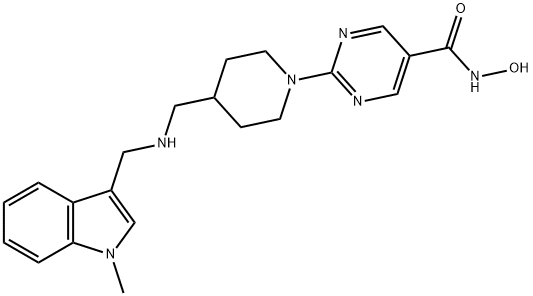
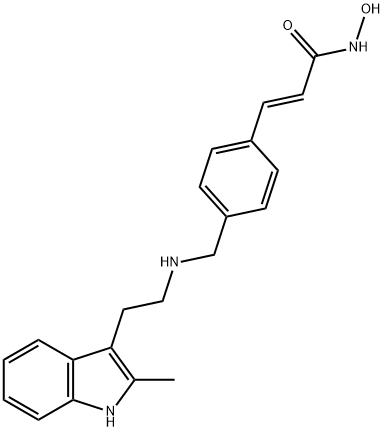
![1,4-Bis[(4-chlorophenyl)-phenylMethyl]piperazine](https://img.chemicalbook.in/CAS/20130318/GIF/CB82617037.gif)
![2-Propenoic acid, 3-[3-[(phenylaMino)sulfonyl]phenyl]-, ethyl ester, (2E)-](https://img.chemicalbook.in/CAS/GIF/1137621-29-4.gif)
You may like
-
 Belinostat >95% CAS 414864-00-9View Details
Belinostat >95% CAS 414864-00-9View Details
414864-00-9 -
 1975-50-4 98%View Details
1975-50-4 98%View Details
1975-50-4 -
 2-HYDROXY BENZYL ALCOHOL 98%View Details
2-HYDROXY BENZYL ALCOHOL 98%View Details
90-01-7 -
 2-Chloro-1,3-Bis(Dimethylamino)Trimethinium Hexafluorophosphate 221615-75-4 98%View Details
2-Chloro-1,3-Bis(Dimethylamino)Trimethinium Hexafluorophosphate 221615-75-4 98%View Details
221615-75-4 -
 61397-56-6 CIS BROMO BENZOATE 98%View Details
61397-56-6 CIS BROMO BENZOATE 98%View Details
61397-56-6 -
 14714-50-2 (2-Hydroxyphenyl)acetonitrile 98+View Details
14714-50-2 (2-Hydroxyphenyl)acetonitrile 98+View Details
14714-50-2 -
 118753-70-1 98+View Details
118753-70-1 98+View Details
118753-70-1 -
 733039-20-8 5-broMo-2-chloro-N-cyclopentylpyriMidin-4-aMine 98+View Details
733039-20-8 5-broMo-2-chloro-N-cyclopentylpyriMidin-4-aMine 98+View Details
733039-20-8